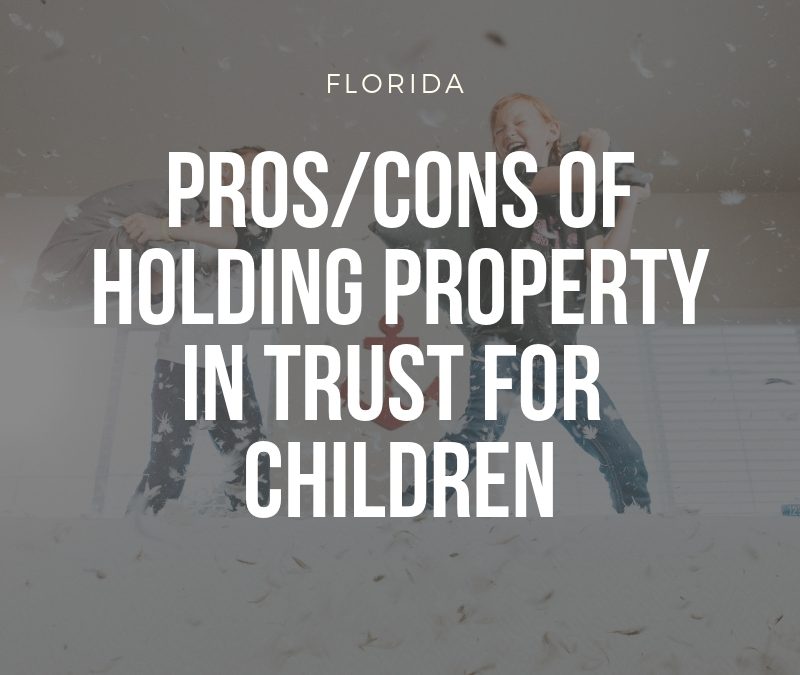Not many people need to be concerned about leaving their adult children so much money that they might easily choose to become lazy and do nothing with the rest of their lives. But, it’s not uncommon for some parents to be concerned that their adult children/grandchildren may waste their inheritance on drugs, alcohol, and fast living, or lose it gambling, have it taken by creditors, or have a spouse take all or a portion of it in a divorce settlement.
However, holding property in trust for your adult children/grandchildren can protect it from their creditors and spouses, and keep it from being squandered away. What’s more, the property you place in the trust will avoid probate and some taxes.
But, like most things in life, holding property in trust has its advantage and disadvantages, and those can factor into whether or not it’s a good idea for you. This is why it’s important that before you decide to hold property in trust for your adult children/grandchildren, you should understand the pros and cons of doing so.
The Pros
- Trusts Offer a Lot of Protection
If you need to keep a financially irresponsible child from squandering his or her inheritance, or protect a child’s inheritance from being allocated to creditors during a bankruptcy or to his her spouse in a divorce proceeding, a trust is flexible enough to help facilitate all of this and more.
For example, if your child has a car accident and is sued for $100,000, a court cannot force the trust funds to be used to pay the judgment. In addition, if your child gets laid off from work for any reason and ends up in bankruptcy, the court cannot liquidate any assets held in the trust.
Likewise, if your child gets divorced, his or her spouse will have no claim against the assets in the trust. What’s more, when your child dies, the property held in the trust will be inherited by his or her children, your grandchildren or, in some cases, to whomever your child chooses. But, it won’t go to his or her spouse, who might then remarry and give it their new spouse, leaving your grandchildren with nothing going to yours.
- Trusts Avoid Probate and Offer Quicker Resolution
Any assets held in your name and for which the ownership does not automatically transfer when you die will be subject to probate. Assets you hold in trust will avoid probate because they are legally owned by the trust, not you.
Furthermore, probate can last for months and even years and drain the estate’s assets with court costs and attorney’s fees. But, since assets you place in a trust avoid probate, a trust can ensure that its beneficiaries inherit quicker, saving them both time and money.
- Trusts Avoid Guardianship
It can be a nightmare if you suffer a mental or physical setback that renders you incapable of handling your personal or financial affairs. If you don’t have the proper documents in place, a court will appoint a legal guardian to handle your affairs. But, if you don’t want a court making this decision, the right kind of trust will allow you to decide for yourself who will manage your estate in the event you are unable to do so.
- Trusts Are More Difficult to Contest
We often hear about a person’s last will and testament being contested by disgruntled or disinherited family members. However, we don’t hear this about trusts so often because they are much more difficult to contest. This can be a real benefit if you are concerned about making sure that your wishes carried out.
- Greater Privacy
Unlike probate proceedings, trusts don’t require you to file anything with the court. This ensures a great deal of privacy because your trust’s affairs will not be available for public scrutiny.
The Cons
- Trusts Are More Complex
Because trusts are complex, you will need the assistance of a qualified attorney to ensure that it is set up properly and does what you want it to do.
- Trusts Can Be Expensive
Because you need an attorney’s help to set up a trust properly, they can be expensive. In fact, this expense, along with the cost of transferring assets into the trust, can cause them to be much more expensive than having a will drawn up.
- Trusts Require More Attention and Detail
The instructions you give your trust should be well thought out and every step should be detailed. Furthermore, the language that you use should be carefully considered to ensure that it does what you want it to do.
- A Trust Does Not Eliminate The Need For a Will
There will almost certainly be assets that you don’t want (or need) to put in your trust. Therefore, you will still need a will to account for the distribution of these assets.
Ultimately, everyone’s situation is different, so it’s almost impossible for someone else to say whether or not you need to hold property in trust for your adult children/grandchildren, at least without first reviewing your circumstances. Even so, the benefits of holding property in trust should at the very least inspire you to inquire more about using a trust as an effective estate planning tool.
Contact Lynchard & Seely, PLLC:
Florida Estate Planning Attorneys
Our estate planning attorneys would love to discuss the pros and cons of holding property in trust for your adult children/grandchildren and how it can be incorporated into your overall estate plan. To learn more, contact Lynchard & Seely, PLLC, either online or by calling 1-850-936-9385.
Want Help With Your Estate Plan?
Click Below to Schedule a FREE Initial Consultation!
Lynchard & Seely – COVID-19 Update
We want to update you on the steps we are taking to ensure we can continue to meet your legal needs in a secure and reliable manner. This year marks our firm’s 20th year in Navarre, and our team remains fully operational and here to support you and our community...

3 Florida Estate Planning Documents You Need Right Now
Three, fairly simple Florida estate planning documents is all you need. While, other things can help more, these will get you by in a pinch.

Estate Planning For Small Business Owners
Estate Planning for Small Business Owners – You have to think about more when estate planning if you have a business.
Want Help With Your Estate Plan?
Click Below to Schedule a FREE Initial Consultation!

